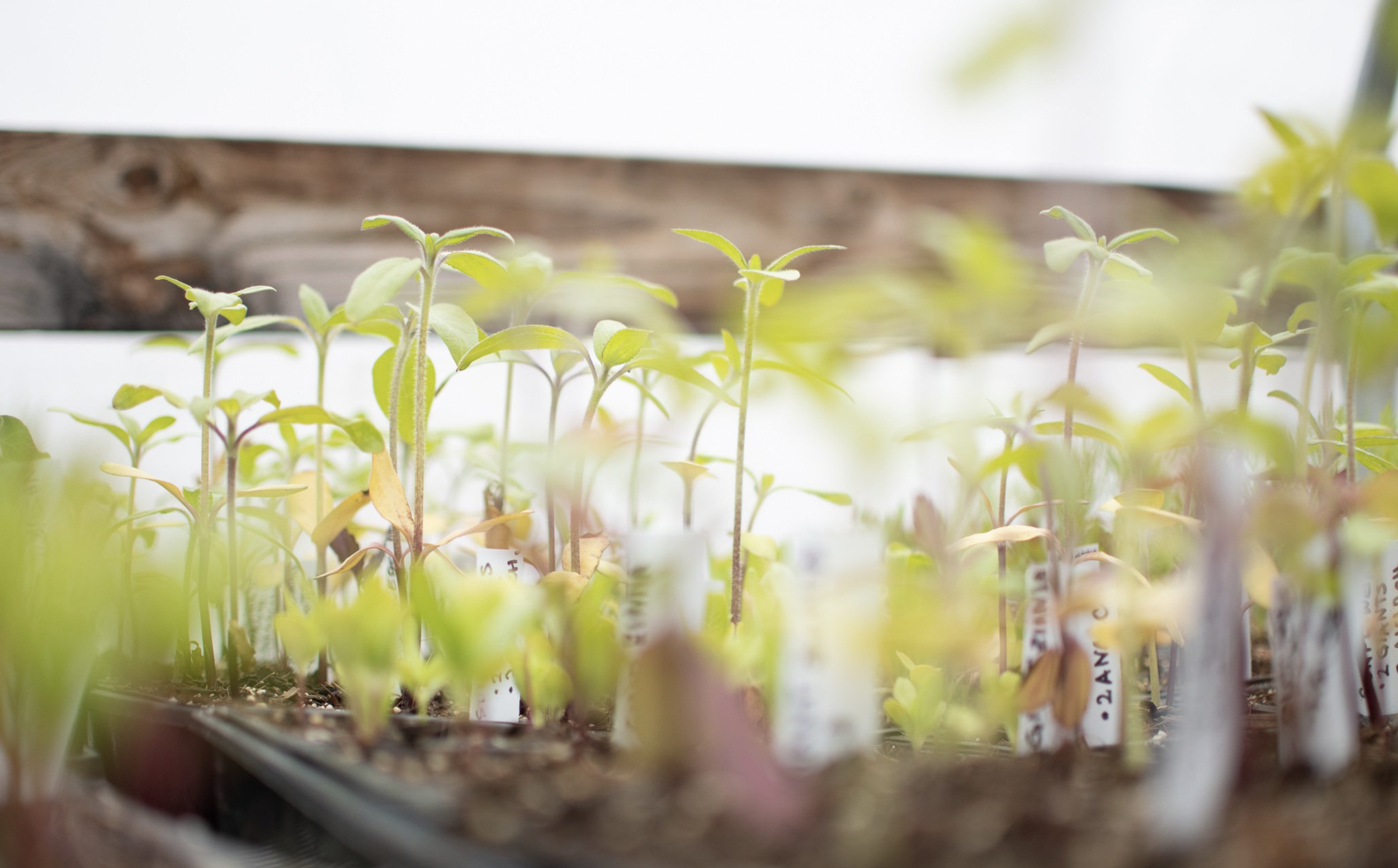Just Your Neighborhood Farm
City Sprouts Farm is welcoming Western Washington University students to get down in the dirt and learn real farming skills while they connect with their community.
June 8, 2022
Story by Shirley Zhou //Photos by Clay Dinehart
The Birchwood neighborhood, located on the northwestern edge of Bellingham, blends urban and rural life. The sidewalks guide you past older homes lined with lush yards.
The sizable lots, common throughout the neighborhood, are long and narrow. With such a rural atmosphere, it’s not surprising to discover the half a hectare of farmland tucked behind a paved driveway and storage buildings.
As spring arrives in Bellingham, City Sprouts becomes filled with a much anticipated wave of lush green vegetables. // Clay Dinehart
Once riddled with invasive blackberry brambles, Ellie Duncan and Annah Young have since transformed the land into an urban farm. What started as an experimental farm project has now blossomed into a site for education and food access.
The entrance to the farm is marked by an aged, wooden fishing boat painted with big, red letters reading, “City Sprouts Farm.” Before you even reach the gate, you’re greeted with the sound of two dogs barking excitedly.
Across the street from the farm, sits Birchwood Elementary School. The sound of children’s laughter and cheerful shrieks echo from the playground. Listen a little closer, and you can hear a chorus of birds chirping in the trees.
This year, City Sprouts partnered with Western Washington University to offer students a work-study opportunity at the farm. Through the partnership, the farm gets some extra help and students have the chance to reconnect with the land and learn farming skills.
“After working alone, just Annah and I,” Duncan said. “It’s been so great to have the work-study folks . . . to be able to tackle projects together; it can be really demoralizing to have like 100 feet of carrots to weed and it’s just two of you.”
City Sprouts is a production-based farm established in 2018, meaning it operates as a for-profit business, but increasing food access in the neighborhood is driving their work. Duncan and Young are trying to find the balance between running a business and providing a place for community members to engage in farming.
“It’s really hard to have a viable salary for two people on one acre,” Duncan said. “There are a lot of urban farmers who have a business that supports them, but they’re growing really high-value crops.”
Since the farm is limited to less than half a hectare, Duncan and Young only grow food that can yield greater quantities on limited space — like greens, tomatoes, zucchini and cucumbers. This way, their customers can get a range of vegetables.
Western Washington University student volunteer Seda Foley helps tend to the fields at City Sprouts Farm. // Clay Dinehart
From classroom to farmstead
A typical harvest day on the farm begins with collecting vegetables before the sun wilts the greens. After the vegetables are washed and stored, the afternoon is devoted to weeding, planting and delivering produce around town.
With the midday sun shining overhead, Duncan and Young are sifting through the soil and plucking weeds to give the beets room to grow. A meter away are Riley Collins and Seda Foley — City Sprouts’ work-study students. The two students use hula hoes — long, wooden sticks with metal, stirrup-shaped attachments at the end — to weed through the soil with a back and forth pulling motion.
“At first, when I got this job, I didn’t really see the connection between the work I was doing at the farm and my schoolwork,” said Foley, who started working at City Sprouts in late March 2022.
Foley, a Western undergrad majoring in law and society, came to see how access to fresh, nutritious food can be limited.
“Providing [food] to people who wouldn’t be able to get [it] any other way is super important to me,” she said.
Western’s work-study program encourages students to apply what they learn in the community to their schoolwork, but farming at City Sprouts has provided even more for Foley. Although the job is laborious, Foley has found herself looking forward to every Monday and Wednesday when she gets to work on the farm.
“It is almost meditative because you’re just working with your hands, you’re working with the earth and there aren’t many distractions,” Foley said. “For me, it’s just a nice time to think and be outside.”
Collins, an agroecology major at Western, shares a similar experience. Whether they’re working in freezing rain or under the blazing sun, being outside all day imparts a rewarding feeling when the workday finishes, Collins said.
“I thought I was only going to be doing farming for a little bit, or as a hobby, but I literally cannot imagine myself working inside after doing all this,” Collins said.
The methodical process of weeding is punctuated with the occasional laugh, and their conversations range from farming methods to relationships or astrology. Watching Duncan and Young bounce ideas off each other and choose their crops has inspired Collins to operate their own farm one day. Having the right partner, Collins realized, is vital to success.
Freya the dog basks in the sun at the urban farm in Bellingham, Washington. // Clay Dinehart
Scaling up and down
Urban farming isn’t a realistic replacement for large-scale agriculture because of size limitations, but it can give people more control over how their food is grown and distributed, according to a Johns Hopkins study.
To tackle the flaws in the food system, we must first understand where food comes from and acknowledge that not everyone will be able to transition to a different form of farming, Collins said.
“You can’t just say…‘Shut down all those farms, we’re actually gonna have urban gardens instead.’ That is such a utopian thing that I would love to happen, but it’s not realistic,” they said.
Over the last few decades, the distance food travels before it gets to the table has been steadily increasing in the U.S., research shows. Produce and processed food are estimated to travel an average of over 2,000 kilometers before they’re eaten, according to a report by the National Center for Appropriate Technology. This is about the same distance as driving from Bellingham to Los Angeles, California.
“With separation comes great vulnerability because if something in the system changes, then you may bear the impact of not having food, but you don’t have the power within that system to change it,” said Terri Kempton, manager of The Outback Farm at Western.
The large-scale U.S. food system has created a disconnect between people and the land — many people do not know where their food comes from, according to a Portland State University study.
To Collins, it’s all about harnessing the “mosaic of food production.”
“It’s really important to have urban farms because you’re transporting [food] less, [and] people in the community are seeing their food being grown right in front of them,” Collins said. “You can meet your farmer and, therefore, talk about what your specific needs are.”
The greenhouse is essential to the farm - it works as a nursery for sprouting plants to establish their roots before being transferred to the outside. Bellingham, Washington. // Clay Dinehart
Sharing the farm
Most of the produce grown by City Sprouts goes to community-supported agriculture (CSA), a business model where the customer commits to supporting a farm by subscribing to get a share of food on a regular schedule. The CSA model is an effective way of connecting consumers to local products and forming relationships with farmers, according to the U.S. Department of Agriculture.
City Sprouts operates its CSA on a sliding scale, meaning the customer chooses how much they pay based on their income. This way, people who can’t afford as much still have access to fresh produce, Duncan said.
The farm offers another alternative through its work exchange program. Customers commit to working one day a week in exchange for a food box, Duncan said.
“A lot of our CSA members are right here in the Birchwood neighborhood,” Duncan said. “People walk here to come and pick up, which is something we really love.”
Once the spring quarter is done, Foley is planning on doing a work exchange in the summer for her own CSA box.
“I love fresh veggies, and I am trying to be more healthy about what I eat,” Foley said. “Having veggies around will inspire me to cook more and eat better.”
Although City Sprouts is primarily a production-based farm, Duncan said she would love to incorporate more educational and community-building projects in the future.
The farm grows produce for the Bellingham-based Sea Mar Community Health Center’s FARMacia program — a weekly, free farm stand. The clinic serves a large Latinx community, and City Sprouts is set on planting diverse and culturally-appropriate vegetables for the clinic’s patients, like poblano peppers and tomatoes.
Additionally, City Sprouts donates food to Common Threads Farm, a local nonprofit aimed at connecting children to healthy foods through gardening and cooking programs. A portion of City Sprout’s produce also goes to the Birchwood Food Desert Fighters — a grassroots group fighting for food access in the neighborhood.
Being an urban farm, City Sprouts neighbors are not other farm lands or cattle, but apartment buildings and homes. // Clay Dinehart
Toward the future
While City Sprouts has only been in operation for four years, Duncan and Young have faced a fair share of challenges.
This year’s unusually wet and cold spring has set the farm a month behind schedule. Almost all the vegetables, especially greens, had to be replanted due to damage from slugs. Duncan said many other farms have been experiencing the same obstacles posed by the weather.
“This is probably the most challenging season of farming that I’ve ever had,” Duncan said.
Adapting to these challenges is difficult, but not impossible.
“We have a certain amount of resilience to climate change just as far as crops go,” Young said. “We don’t depend on one or two crops for our entire operation, but we’re also vulnerable because we’re so small.”
Collins recalls how much the climate has changed over the years.
“I think telling each other stories of where we’ve been and how weather has impacted it…builds really strong tools for us to be able to farm in the future,” Collins said.
Engaging with farming can look like everything from sharing farming strategies to teaching people where their food comes from, Collins said.
“When people are working on sustaining themselves and each other through food, then there’s an inherent community,” Kempton said. “Realistically, community is our best way forward.”
Shirley Zhou is an environmental studies major with a passion for environmental justice. Her love for cooking has inspired her to raise awareness of food issues through storytelling.





